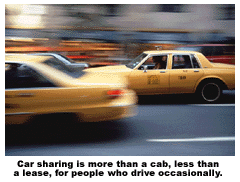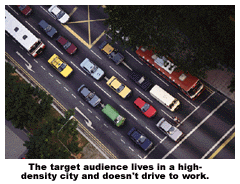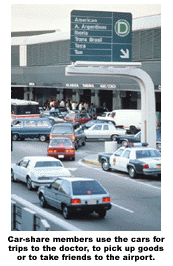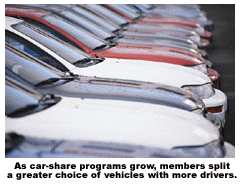|
Car sharing's time comes
|
 |
July 19, 2000: 11:54 a.m. ET
A European idea for folks who don't drive every day catches on in U.S. cities
By Staff Writer Alex Frew McMillan
|
NEW YORK (CNNfn) - Robin Chase thinks she knows what city dwellers who don't drive to work every day want. Chase, CEO of Cambridge, Mass.-based Zipcar, just doesn't know how to describe it.
"I avoid calling it anything," Chase, 41, said. She has a slogan, but not a description of the concept. "I call it 'Zipcar. Wheels When You Want Them.' "
Snappy. But what does that mean, exactly? "We've been toying around with different unsatisfactory things [descriptions] for the press."
Similar companies have the same problem. "We just say it's an alternative to owning a car, for people who don't need to drive every day," said Maren Souders, outreach and marketing director for CarSharing Portland Inc. "We don't really have a couple-word catchphrase."
Car share, or car timeshare
Zipcar isn't car rental. Car sharing is the most-accepted term for what the company does. But Chase doesn't like that phrase. Americans don't like to share, according to her market research.
 The driving force is perhaps best-described as a "car timeshare." Members sign up for the program, pay dues - typically by credit card - and get access to a pool of communal cars parked around their city. The driving force is perhaps best-described as a "car timeshare." Members sign up for the program, pay dues - typically by credit card - and get access to a pool of communal cars parked around their city.
They pay for the time they use the car and for the mileage they put on it. Members share the cars with each other, normally making reservations remotely via Internet or wireless, or just by phone. They leave the program when they want, canceling their membership and returning the smart card and/or keys they use to get into the cars.
Think of it as a co-operative lease, for people who don't need a car very often but like to drive every now and then. The target audience lives in a high-density city, doesn't need a car all the time, but does the occasional big grocery shopping and makes a trip to Ikea once in a while.
A different sort of car pool
Though the prices vary by program, Zipcar works like this: Members sign up online and pay a $300 refundable security deposit, to cover accidents and the like. (Members are responsible for the first $500 for any property damage they cause, too). Then they cough up a $75 annual fee and a $25 application fee.
There's a half-hour orientation program, where members learn how to use the key-card and keys to access the cars. After that, they pay $4.50 an hour and 40 cents a mile to drive Zipcar's nine Volkswagens. Maintenance, cleaning and fuel are included.
 Zipcar is adding about two cars a week, Chase said; Beetles, four-door Golfs and Passat station wagons. The Passats cost $6.50 an hour. She chose the cars, starting with the new Beetle, for convenience and to project a cool, urban image. Zipcar is adding about two cars a week, Chase said; Beetles, four-door Golfs and Passat station wagons. The Passats cost $6.50 an hour. She chose the cars, starting with the new Beetle, for convenience and to project a cool, urban image.
Making a reservation via the Web site takes "about half a minute, and then you're done," Chase said. Of course, you need to live within walking distance or a subway trip of where the cars are parked.
Zipcar, which currently operates only in Boston, Cambridge and Somerville, Mass., has 70 members so far. It incorporated in January and launched in the middle of June.
A new idea for a new century?
It is not unique. Susan Shaheen is project manager of CarLink, an experimental San Francisco-based car-share program set up by the Institute of Transportation Studies at the University of California at Davis. She also did her graduate studies on car sharing, which originated in Europe.
"Within the last three months I've noticed a ton of activity in North America," she said. "It's pretty exciting. We're getting closer and closer."
She thinks the Internet explains much of the sudden popularity of the idea. In Europe, grass-roots programs developed near each other but without knowing about each other, she said. Thanks to Internet communication, the American programs can feed off each other, she said.
Chase founded Zipcar with Antje Danielson, who studied geochemistry in Berlin and saw the car-timeshare concept in action in Germany. It has been most successful in Switzerland.
North America imports the concept
Now Canada has several car-sharing programs, starting with Montreal-based CommunAuto in 1995. The first U.S.-based program started in Boulder, Colo., in 1997. The largest programs so far are Portland, Ore.-based CarSharing Portland and Seattle-based Flexcar.
 CarSharing Portland, which kicked off in March 1998, has 285 members, sharing 18 cars. All the vehicles are stationed within a 50 blocks of downtown Portland. CarSharing Portland, which kicked off in March 1998, has 285 members, sharing 18 cars. All the vehicles are stationed within a 50 blocks of downtown Portland.
Souders, the marketing director, said the program has been growing "slowly but steadily." It now adds about 15 members a month.
Most are either 25- to 35-year-olds without kids, or they're 45- to 55-year-old empty nesters who no longer need two cars, she explained. About 60 percent of the members don't own a car at all, and 40 percent are couples who own one car they want to supplement.
CarSharing Portland started as an environmental program. But that's not necessarily the motive for the users.
"We have some members who use them every month or two, some every month, and some two or three times a week," Souders said. She picks up her groceries. Others run around town to doctor's appointments, to pick up a friend at the airport or to take a trip to the Pacific coast, she said.
"It's a niche that it's time someone filled," Souders said. "It's an idea whose time has come." At $1.50 per hour and 40 cents a mile, the program is cheaper than Zipcar.
Building a business in Beantown
Besides Boulder and Seattle, there are other programs in Rutledge, Mo., and Traverse City, Mich. The UC-Davis program and one at UC-Riverside ultimately may spin off into companies.
Car-sharing programs are in the works for San Francisco and Chicago. Both hope to open before year-end. Details of the majority of the programs are available at the CarSharing Network Web site.
Chase does not have a transportation background. She was a management consultant and a trade-journal editor before she co-founded Zipcar.
She wants to build it into a viable business. Many of the earliest programs were small co-ops.
"We're the first guys to bring it to the East Coast, and the first to take a business approach," she said. She is trying to arrange her first round of angel financing. She said she has lined up a few "medium-sized backers," Boston institutions and individuals.
Still, Chase is taking it slow. "Our strategy right now is to penetrate this core, this corridor from Cambridge through the center, heart of Boston," she said. "We will be growing organically out from the edges," and then might take it to other cities from there.
A better reception than expected
Zipcar has not yet done any advertising. But the word-of-mouth reception has been terrific, according to Chase, who says she was a bit skeptical of her own idea. People have told her they heard about Zipcar in the bank, the supermarket, from friends.
 The company is registering about 20 new members a week, she said, "which is beyond my estimates. We have been getting e-mail response and the telephone calls, and it makes me giddy." The company is registering about 20 new members a week, she said, "which is beyond my estimates. We have been getting e-mail response and the telephone calls, and it makes me giddy."
She thinks reasons beyond the environmental benefit explain car-sharing's popularity with members. Cities are growing but the road system is fixed, she pointed out.
"The first reason they're doing it is because of convenience and the economics of it - it just makes sense," Chase said. City dwellers who don't drive to work don't use cars much, so this cost-benefit analysis appeals to them, she said.
Shaheen, the CarLink manager, thinks Global Positioning System, or GPS, technology will boost car sharing. Coupled with wireless tools like PalmPilots, members could check where the cars are remotely, make a reservation, then walk to the nearest car without needing a computer or phone.
Will the heavy hitters enter the ring?
Of course, if car sharing truly catches on, the big boys likely will step in.
In mid-May, Hertz Corp. began an experimental car-share program in San Francisco in conjunction with BART, the Bay Area Rapid Transit system.
A "home-end" driver uses the car at night. He or she drives to a BART station in the morning to commute into central San Fran.
A "business user" coming out of the city picks up the car and drives it to work in the suburbs. The business user can use the car all day.
At the end of the day, the business user drives back to the BART station. The home-end driver picks the car up and drives home. The home-end user has the car on weekends.
That's the simple version. Actually, as the number of cars grows, users can have different cars and share with numerous users rather than one.
Car makers look at sharing
At the moment, Hertz is offering the program at only one station, Fremont, the end of the line closest to Silicon Valley. But it is considering expanding to three more stops on the BART train network.
The rental agency has a promotional fare of $300 a month for the business user and $350 a month for the home-end user for a Ford Escort or Focus, with upgrades to S/UVs or convertibles available at an extra charge.
Avis has no similar "share" program, yet. According to a spokesman, the closest it comes is a "mini-lease" of up to 11 months, designed for non-Americans who are temporarily in the United States.
Shaheen said carmakers are keen on getting in on the action, too, sometimes using alternative-energy cars. Honda has sponsored two University of California projects. Toyota is working on one with UC-Irvine. Ford, Nissan, Mercedes and General Motors all have expressed an interest or already have started programs, she said.
"The more convenient and accessible you make it, the more people will use it," Shaheen said. 
-- Click here to send email to Alex Frew McMillan
|
|
|
|
|
 |

|

